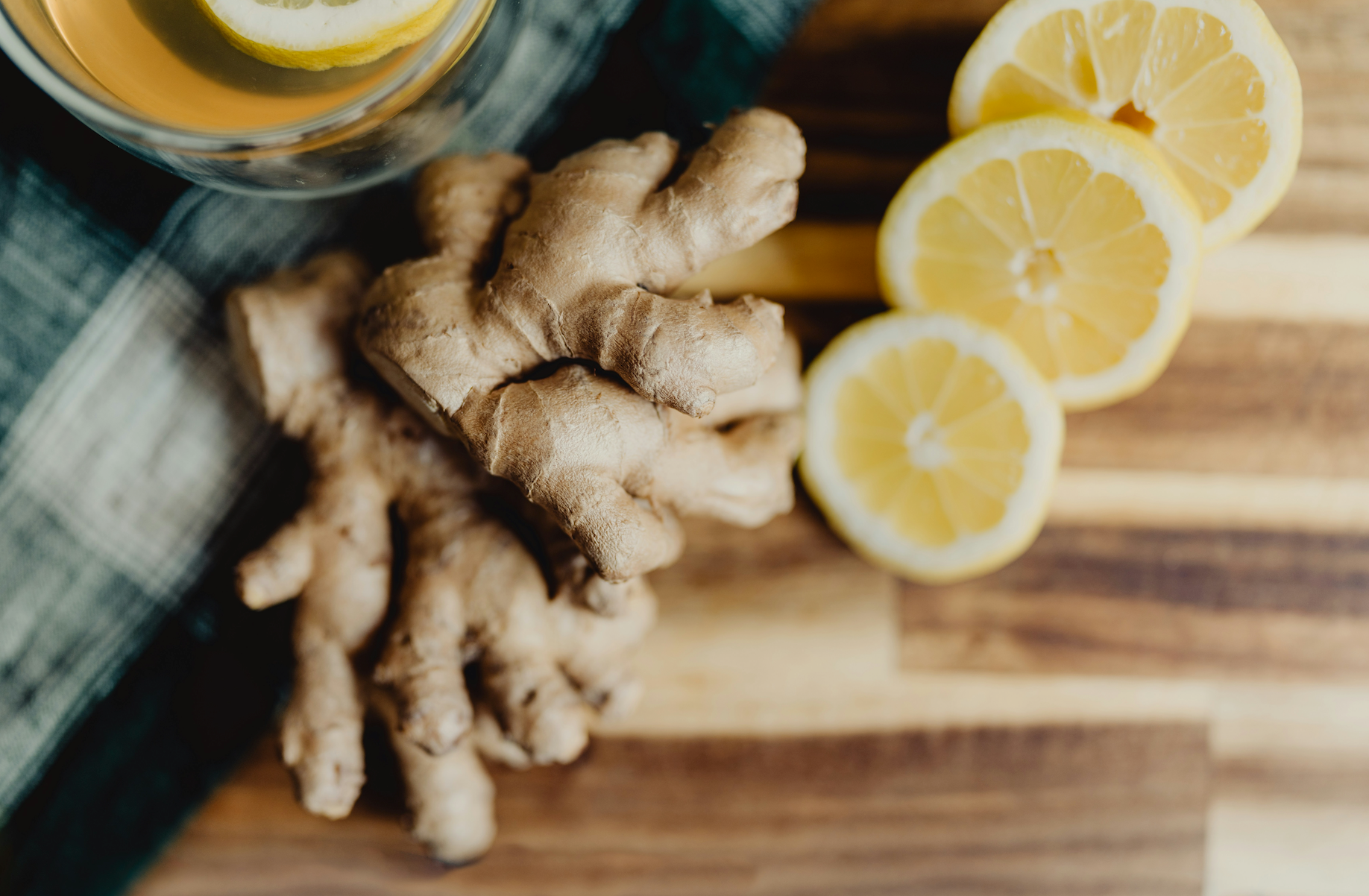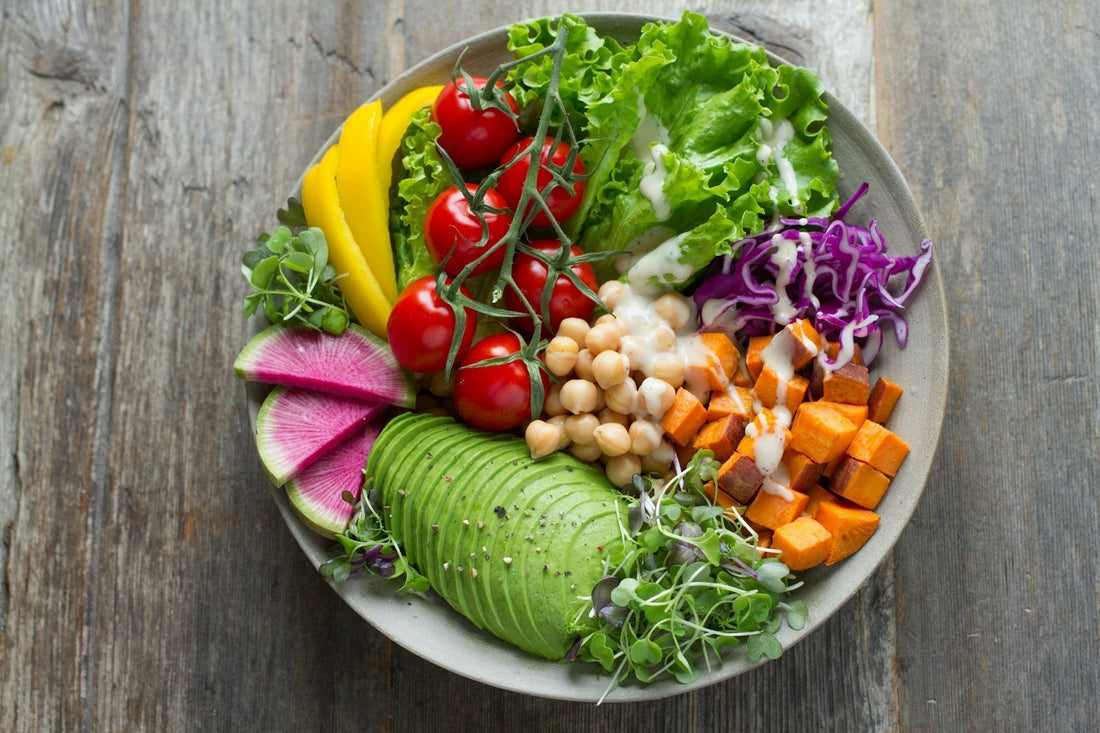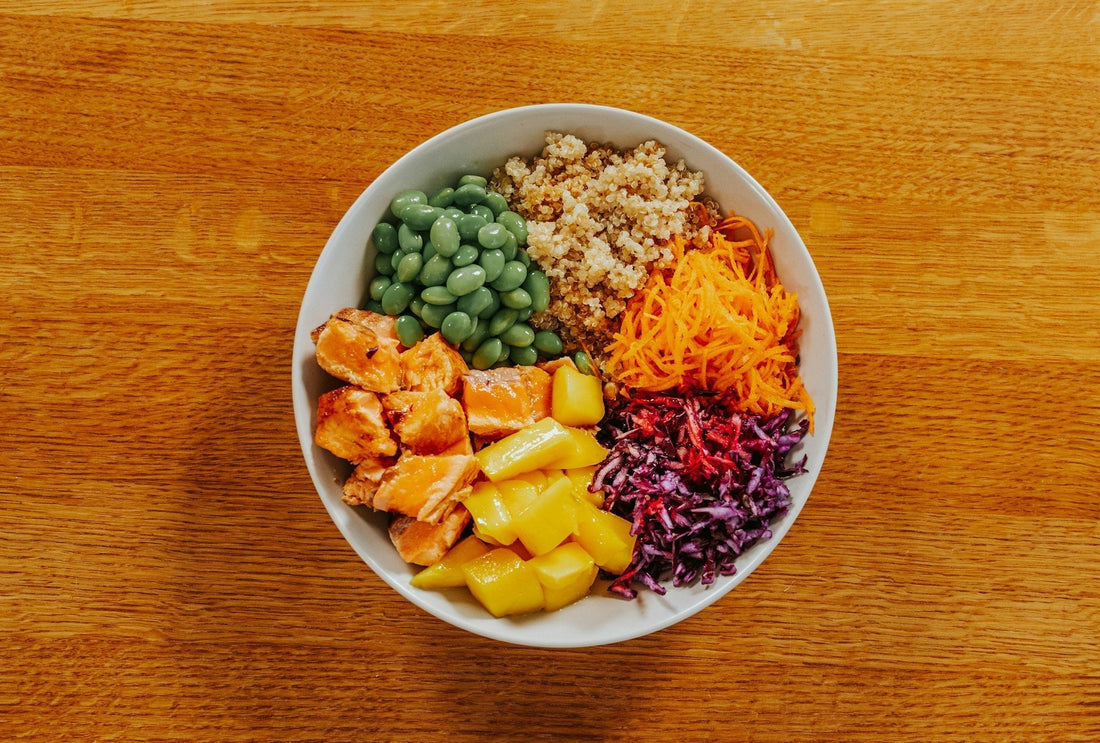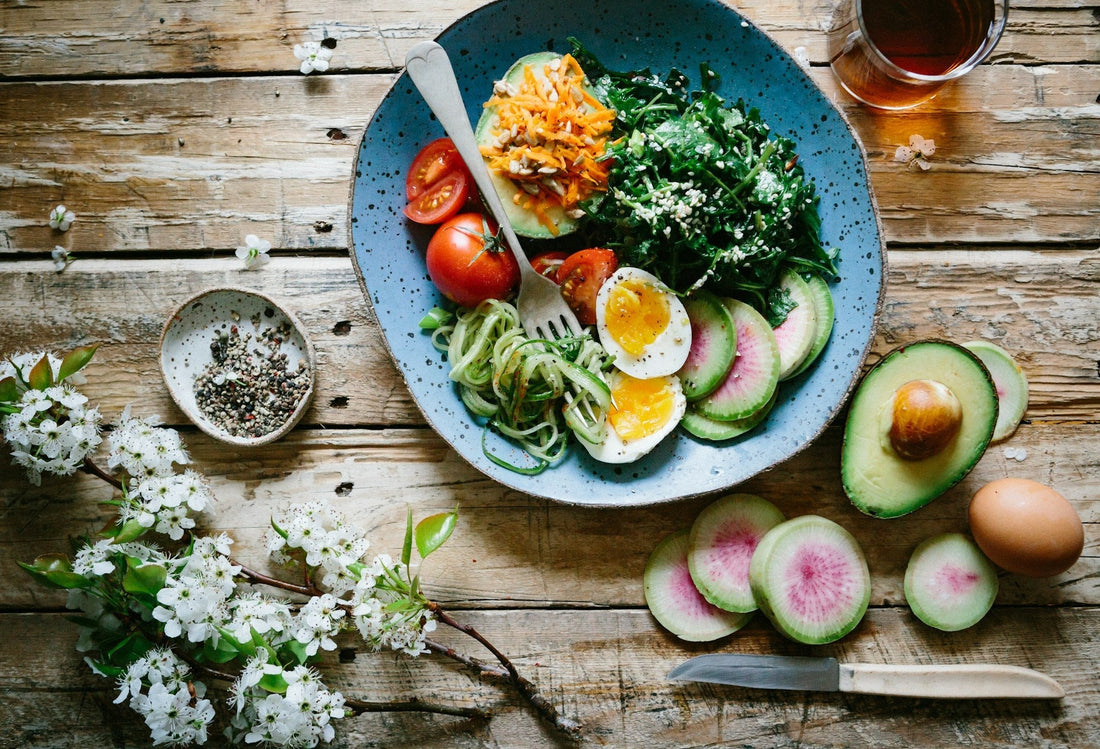Wellness Blog
The content on this blog is for general informational purposes only and is not a substitute for professional medical advice, diagnosis, or treatment. Always consult your healthcare provider before making changes to your health routine or taking new supplements.
Feeling Tired All the Time? Here’s How to Naturally Reset Your Energy
Always tired, even after 8 hours of sleep? This guide unpacks the hidden reasons behind low energy and how to naturally recharge your body.
Learn moreSleep support: Magnesium for deeper sleep: is it worth trying?
Magnesium deficiency is more common than many people realise. Many Australians are unknowingly deficient, which can lead to restless nights, increased stress, and poor overall health.
Learn moreWhy Nutrition & Lifestyle Matter for Menopause: Best Diet & Health Tips
Menopause can feel like a rollercoaster—one minute you're fine, the next you're overheating, struggling to sleep, or dealing with unexpected mood swings. Sound familiar? You're not alone.
Learn moreDietary and Lifestyle Strategies to Managing PCOS
Polycystic ovary syndrome (PCOS) affects an estimated 8–13% of reproductive-aged women, bringing with it a unique set of challenges—from hormonal imbalances and metabolic changes to emotional stress.
Learn more5 Zinc Benefits and Why You Need It in Your Diet
Zinc is vital for numerous processes in the body. While it often doesn't receive the same spotlight as other nutrients, zinc plays a critical role in keeping us healthy. What is Zinc and Why is it Essential? Zinc is an essential trace mineral, meaning your body cannot produce or store it, so you must obtain it through diet or supplements. It contributes to over 300 enzymatic processes, making it critical for maintaining overall health. From supporting immunity to promoting healthy skin and hair, zinc is a multitasker that your body can't do without. Here are five clinically supported benefits of zinc and why you should ensure this mineral is part of your diet. 1. Supports Immune Function Zinc is essential for a strong immune system. It activates white blood cells like T-cells, which help fight off infections. Clinical studies show that zinc supplementation can reduce the duration of colds by boosting the body's natural defense mechanisms. How it works: Zinc prevents viruses from replicating and strengthens the integrity of mucous membranes, your first line of defense against pathogens. Best for: People prone to frequent colds or infections. 2. Aids in Wound Healing Zinc plays a vital role in healing, whether it's for minor scrapes or more serious injuries. It aids in tissue growth and repair while its anti-inflammatory properties help minimize swelling around wounds. A deficiency in zinc has been associated with slower wound healing. How it works: Zinc supports cell growth and controls inflammation, both of which are essential for the healing process. 3. Promote Skin and Hair Health Zinc is a beauty hero when it comes to your skin and hair. It helps regulate sebum production, which can prevent clogged pores and acne. Additionally, it supports the production of collagen. Hair health: Zinc supports hair follicles by reducing oxidative stress and regulating hormones, both of which are vital for hair growth and reducing hair thinning. Skin conditions: Studies have shown that zinc supplementation can significantly reduce acne and inflammatory skin conditions. 4. Support Reproductive Health Zinc plays a vital role in hormonal balance, making it essential for reproductive health in both men and women. For women: Zinc helps regulate hormones, maintain a healthy menstrual cycle, and support egg quality. For men: Zinc boosts testosterone levels and supports sperm production. It also acts as an antioxidant, protecting sperm from damage caused by oxidative stress. 5. Supports General Wellbeing and Reduces Free Radicals Zinc acts as a powerful antioxidant, helping to neutralise free radicals formed in the body. This reduces oxidative stress, which can harm cells and contribute to aging and chronic diseases. Zinc also supports overall health and wellbeing, ensuring the body has the resources it needs to perform optimally. How it Works: Zinc's antioxidant properties help protect cells from damage and support healthy metabolic processes throughout the body. Additional Benefits of Zinc While these five benefits are among the most well-documented, zinc has many other health benefits: Improves digestion: Zinc supports enzyme production, aiding in the breakdown of food and absorption of nutrients. Supports eye health: Zinc is critical for maintaining good vision, particularly in low light. Reduces inflammation: Zinc's antioxidant properties help neutralise free radicals and reduce inflammation throughout the body. Signs of Zinc Deficiency Zinc deficiency is more common than you might think, especially among vegetarians, vegans, and individuals with digestive disorders like Crohn's disease. Symptoms of deficiency include: Frequent infections Slow wound healing Hair thinning or loss Dry or flaky skin Poor sense of taste or smell If you notice any of these symptoms, consider speaking to a healthcare professional for advice. How to Get Enough Zinc in Your Diet Zinc is found in a variety of foods, making it relatively easy to incorporate into your diet: Animal-based sources: Oysters (the richest source), beef, lamb, chicken, and eggs. Plant-based sources: Pumpkin seeds, chickpeas, lentils, cashews, and quinoa. Fortified foods: Breakfast cereals and plant-based milk often include added zinc. For vegetarians or vegans, it's important to note that plant-based zinc is less bioavailable, so you may need to consume higher amounts or consider supplementation. How to Choose the Right Zinc Supplement If you're not meeting your zinc requirements through diet alone, supplementation can help. Look for bioavailable forms like zinc glycinate which are easier for your body to absorb and less likely to cause stomach upset. Always take your zinc supplement with a meal. Dosage: The recommended daily intake for adults is 8 mg for women and 14 mg for men, though higher doses may be prescribed for specific deficiencies. Final Thoughts Zinc is a small but mighty mineral with far-reaching benefits for your body and mind. From boosting immunity to promoting healthy skin, and hair, zinc deserves a top spot in your diet. Whether you're enjoying zinc-rich foods or considering a high-quality supplement, investing in this essential nutrient is highly regarded for your overall health. *Always read the label. Follow the directions for use. If symptoms persist, talk to your health professional. Vitamin and/or mineral supplements should not replace a balanced diet. References https://ods.od.nih.gov/factsheets/Zinc-HealthProfessional/ Almohanna, HM., Ahmed, AA., Tsatalis, JP. Tosti, A. 2019. “The Role of Vitamins and Minerals in Hair Loss: A Review”. Dermatology and Therapy, 9. 1 (Mar): 51-70. https://www.ncbi.nlm.nih.gov/pmc/articles/PMC6380979/# Shankar, A. H., & Prasad, A. S. (1998). Zinc and immune function: the biological basis of altered resistance to infection. The American journal of clinical nutrition, 68(2 Suppl), 447S–463S. https://doi.org/10.1093/ajcn/68.2.447S Garner TB, Hester JM, Carothers A, Diaz FJ. Role of zinc in female reproduction. Biol Reprod. 2021;104(5):976-994. doi:10.1093/biolre/ioab023 Fallah A, Mohammad-Hasani A, Colagar AH. Zinc is an Essential Element for Male Fertility: A Review of Zn Roles in Men's Health, Germination, Sperm Quality, and Fertilization. J Reprod Infertil. 2018;19(2):69-81. PMCID: PMC6010824 PMID: 30009140 Zinc: Nutrient Reference Values for Australia and New Zealand.Eat for Health, National Health and Medical Research Council, n.d., https://www.eatforhealth.gov.au/nutrient-reference-values/nutrients/zinc. Accessed 22 Jan. 2025. Lin PH, Sermersheim M, Li H, Lee PHU, Steinberg SM, Ma J. Zinc in Wound Healing Modulation. Nutrients. 2017 Dec 24;10(1):16. doi: 10.3390/nu10010016. PMID: 29295546; PMCID: PMC5793244.
Learn moreVitamin C for Healthy Skin and Boosting Energy
Vitamin C isn't just the vitamin you turn to when you feel a cold coming on—it's an essential nutrient that plays a vital role in your overall health. From strengthening your immune system to supporting glowing skin and collagen production, Vitamin C is a potent antioxidant that supports various body functions. In this article, we'll dive into what makes Vitamin C so important, address common misconceptions, and share practical tips to ensure you're getting enough of this vitamin each day. What is Vitamin C? Vitamin C, or otherwise known as ascorbic acid, is a water-soluble vitamin known for its antioxidant properties. It plays a crucial role in several bodily functions, including: Supporting the immune system: Helps your body fend off illnesses and recover more efficiently. Supporting energy production: Assists in the synthesis of carnitine, a molecule that helps convert fat into energy, keeping you feeling vibrant and focused. Promoting collagen production: Vital for skin elasticity, wound healing, and maintaining youthful skin. Fighting free radicals: Protects your cells from damage caused by oxidative stress, reducing signs of aging. Enhancing iron absorption: Improves the uptake of iron from plant-based sources, which supports healthy energy levels and prevents fatigue. Since your body cannot produce or store Vitamin C, maintaining a consistent intake through your diet or supplements is crucial for maintaining good health. What happens when you don't get enough Vitamin C? While Vitamin C deficiency is uncommon in modern diets, it can still occur, particularly if your intake of fresh fruits and vegetables is consistently low. Even a mild deficiency can impact your energy levels, skin health, and overall wellbeing. Factors such as illness, stress, or smoking can increase the body's demand for Vitamin C, making it essential to maintain adequate levels. Signs of Vitamin C deficiency include: Fatigue or weakness Dry, rough skin Swollen or bleeding gums Poor wound healing How to Incorporate Vitamin C into Your Daily Routine Meeting the Recommended Dietary Intake (RDI) of 45mg of Vitamin C is easier than you might think, thanks to the abundance of fruits and vegetables rich in this nutrient. Here are some practical tips to naturally boost your Vitamin C intake: Include more fruits and veggies in meals: Add half a cup of strawberries to your breakfast and include half a cup of steamed broccoli or add a few slices of capsicum to your lunch or dinner. Blend a quick smoothie: Try blending 1 cup of spinach with 1 kiwi and half a cup of raspberries Keep snacks simple: Easy-to-grab options like 1 mandarin plus a handful of cherry tomatoes Consider a high-quality supplement if your diet is low in fruit and vegetables, it is worth considering supplementation to cover your daily requirement, especially during times of illness or stress. Cooking can reduce Vitamin C content in food, so aim to consume raw or lightly cooked produce when possible. Debunking Common Myths About Vitamin C Myth 1: Vitamin C prevents colds. While Vitamin C won't stop you from catching a cold, it can help reduce the severity and duration of symptoms when taken regularly. Think of it as a way to support your recovery rather than a foolproof defense. Myth 2: More Vitamin C is always better. Your body has a limit to how much Vitamin C it can absorb. Taking excessive doses won't provide extra benefits, as the surplus is simply excreted in urine. Stick to the recommended intake for optimal health without overdoing it. Myth 3: Only citrus fruits contain Vitamin C. Citrus fruits may get all the attention, but they're not the only source of Vitamin C. Foods like capsicum, broccoli, and kale often contain more Vitamin C per serving than oranges, offering plenty of options to diversify your diet. Final Thoughts on Vitamin C Vitamin C is an essential nutrient that goes far beyond its reputation as a cold-fighting vitamin. From supporting your immune system and boosting energy levels, Vitamin C should not be overlooked. The beauty of Vitamin C is how easy it is to incorporate into your daily life. Whether it's through fresh fruits and vegetables, a morning smoothie, or a high-quality supplement, small changes can make a big impact. References National Institutes of Health, Office of Dietary Supplements. (n.d.). Vitamin C: Fact sheet for health professionals. Retrieved January 14, 2025, from https://ods.od.nih.gov/factsheets/VitaminC-HealthProfessional/ Carr, A. C., & Maggini, S. (2017). Vitamin C and Immune Function. Nutrients, 9(11), 1211. https://doi.org/10.3390/nu9111211 Garcia-Diaz, D. F, Lopez-Legarrea, P., Quintero, P. , Martinez, J. A., (2014). Vitamin C in the Treatment and/or Prevention of Obesity. Journal of Nutritional Science and Vitaminology, 60(6),367-379. https://doi.org/10.3177/jnsv.60.367 Pullar JM, Carr AC, Vissers MCM. The Roles of Vitamin C in Skin Health. Nutrients. 2017;9(8):866. Published 2017 Aug 12. doi:10.3390/nu9080866
Learn moreWhy Activated B Vitamins?
We can always do with a little extra energy! No matter how much sleep we get or how thoroughly we stick to our routine, we can all fall victim to the snooze button or a 3pm slump. That's where activated B vitamins come in!
Learn moreCozy Up With These Nourishing Meals
As you gear up for the chilly season, it's time to arm yourself with some delicious and immune-boosting recipes. We've got you covered with our ultimate guide to winter recipes for keeping those pesky colds and flu bugs at bay.
Learn moreWhat Vitamins Should I Take? Your Guide to Choosing the Right Supplements
In today's fast-paced world, it's easy to feel overwhelmed by the sheer number of supplements available. With so many options, how do you know which vitamins are right for you? At Vitable, we believe that good health should be accessible and affordable. That's why we teamed up with health experts to create a quick Quiz that provides personalised supplement recommendations tailored to your health goals, lifestyle, and diet. Let's explore how you can make informed choices when it comes to your health. The "Less Is More" Approach to Supplements At Vitable, we believe in a food-first approach to nutrient intake, with supplements designed to fill the gaps in your diet, not replace a balanced lifestyle. When it comes to vitamins, more isn't always better either. Instead of taking a handful of random supplements, it's important to focus on what your body truly needs. A personalised approach helps ensure you're supporting your health without overloading your system with unnecessary nutrients. Factors to Consider When Choosing Supplements Your Diet: A well-balanced diet should provide most of the essential nutrients your body needs. However, certain dietary patterns, such as vegan, vegetarian, or restrictive diets, may require additional supplementation to prevent deficiencies. Lifestyle Factors: Your daily habits, such as stress levels, sleep patterns, and physical activity, can influence your nutrient needs. For example, active individuals may benefit from magnesium for muscle recovery, while those experiencing high stress may require additional B vitamins to support energy levels. Life Stage and Health Goals: Different life stages call for different nutritional support. Whether you're pregnant, experiencing joint pain or looking to support hair, skin, and nails, choosing targeted supplements is key to meeting your unique health goals. Underlying Health Conditions: Conditions such as thyroid imbalances, digestive issues, or hormonal fluctuations can impact how your body absorbs and utilises nutrients, making it essential to choose supplements that cater to your specific health concerns. How to Identify Nutritional Gaps To determine which supplements are right for you, start by assessing your current health and lifestyle. Some key indicators that you may have a nutrient deficiency include: Frequent fatigue or low energy levels Hair thinning or brittle nails Poor sleep quality Digestive discomfort Recurring illnesses or weakened immunity If you're unsure, taking a personalised quiz, like the one offered by Vitable, can help you pinpoint which nutrients your body may need based on your unique lifestyle and health profile. Essential Nutrients to Consider Everyone's nutritional needs are unique, but some key nutrients play a vital role in overall well-being. Here's a closer look at essential vitamins and minerals, why they matter, and common reasons for deficiencies: Vitamin D: Helps support immune function, bone strength, and mood (1). Many people don't get enough due to factors like limited sun exposure, spending too much time indoors, regular sunscreen use, living in areas with low sunlight, or having darker skin, which naturally reduces vitamin D production Iron: Crucial for energy production and preventing fatigue, especially for menstruating women. Deficiency can result from inadequate intake of iron-rich foods (such as red meat, leafy greens, and legumes), poor absorption due to digestive conditions, vegetarian or vegan diets, or increased demand during menstruation or pregnancy (2). It's always best to consult your doctor before supplementing with iron. Omega-3 Fatty Acids: Supports heart health, brain function, and help reduce inflammation (3). A deficiency can occur if you don't eat enough fatty fish like salmon and sardines, rely heavily on processed foods, or follow a plant-based diet without incorporating alternatives like flaxseeds and walnuts. B Vitamins: Play a key role in energy production and stress management. High levels of stress, diets low in whole grains, lean proteins, and vegetables, or excessive alcohol consumption can deplete these essential vitamins and impact overall well-being (4). Zinc: Important for healthy skin, hair, and immune function. Deficiencies are common in individuals who don't consume enough zinc-rich foods like meat, shellfish, and seeds, or those following plant-based diets, as certain plant compounds can hinder zinc absorption (5). Where Do I Start When It Comes to Taking Supplements? Starting a supplement routine can feel overwhelming, but at Vitable, we make it simple. Our products are scientifically developed to support the key lifestyle and dietary factors that impact the health of both men and women. We use bioavailable, premium ingredients designed for better absorption and to be gentle on the stomach. With our personalised recommendations and flexible subscription options, you can confidently get exactly what your body needs—without the guesswork. Before beginning any supplement regimen, it's essential to consult with your healthcare professional, especially if you have pre-existing conditions or are taking medications. Taking this step ensures that your supplements align with your individual health needs and goals. Final Thoughts Choosing the right vitamins shouldn't be complicated. By focusing on a balanced diet first and using supplements to fill in the gaps, you can achieve optimal health in a way that feels simple and sustainable. Whether you're looking to boost energy, improve sleep, or support overall wellness, taking a thoughtful and personalised approach is the best way forward. Ready to take control of your health? Take our quick and easy expert quiz to receive personalised supplement recommendations today! References National Institutes of Health. (n.d.). Vitamin D: Fact sheet for health professionals. Office of Dietary Supplements. Retrieved from https://ods.od.nih.gov/factsheets/VitaminD-HealthProfessional/ National Institutes of Health. (n.d.). Iron: Fact sheet for health professionals. Office of Dietary Supplements. Retrieved from https://ods.od.nih.gov/factsheets/Iron-HealthProfessional/ National Institutes of Health. (n.d.). Omega-3 fatty acids: Fact sheet for health professionals. Office of Dietary Supplements. Retrieved from https://ods.od.nih.gov/factsheets/Omega3FattyAcids-HealthProfessional/ Hanna M, Jaqua E, Nguyen V, Clay J. B Vitamins: Functions and Uses in Medicine. Perm J. 2022 Jun 29;26(2):89-97. doi: 10.7812/TPP/21.204. Epub 2022 Jun 17. PMID: 35933667; PMCID: PMC9662251. National Institutes of Health. (n.d.). Zinc: Fact sheet for health professionals. Office of Dietary Supplements. Retrieved from https://ods.od.nih.gov/factsheets/Zinc-HealthProfessional/
Learn more












